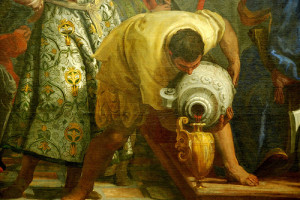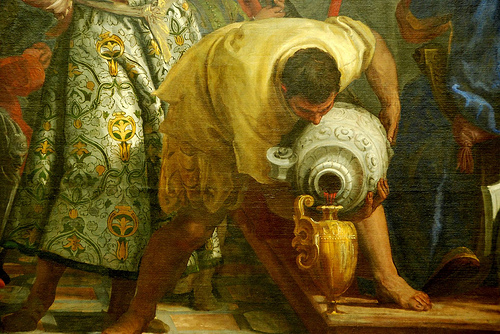
Central idea: The marriage of God and man. Doctrine: Marriage in the Lord. Practical application: Spousal life.
Written as an aid for homilists and a resource for the faithful, this doctrinal homily outline (1) provides insights into the Lectionary readings, (2) explicates a doctrine of Catholic Faith or morals from them, and (3) shows specific ways lay persons can live these truths. (To read more about this approach, click here.)
This outline is written to be in accord with the Homiletic Directory issued by the Congregation for Divine Worship and the Discipline of the Sacraments (2014). (To read an excellent summary of the Homiletic Directory, click here.)
Lectionary 66.
Central idea: The marriage of God and man
Reading 1 Is 62:1-5
For Zion’s sake I will not be silent,
for Jerusalem’s sake I will not be quiet,
until her vindication shines forth like the dawn
and her victory like a burning torch.Nations shall behold your vindication,
and all the kings your glory;
you shall be called by a new name
pronounced by the mouth of the LORD.
You shall be a glorious crown in the hand of the LORD,
a royal diadem held by your God.
No more shall people call you “Forsaken, “
or your land “Desolate, “
but you shall be called “My Delight, “
and your land “Espoused.”
For the LORD delights in you
and makes your land his spouse.
As a young man marries a virgin,
your Builder shall marry you;
and as a bridegroom rejoices in his bride
so shall your God rejoice in you.
- God and his people, Israel, entered a “nuptial covenant” (CCC 1612). It is the nature of a covenant that it stands forever, even if one of the parties violates its terms.
- Israel broke the covenant, but God will not. Instead, God will vindicate Israel and will glorify her.
- It is hard to imagine a more beautiful and attractive image of God’s love for his people than the nuptial one: “As a bridegroom rejoices in his bride so shall your God rejoice in you.”
- Fundamental to this image is the truth that marriage really is a good thing.
- If we live in an age in which people don’t want to marry and want to divorce, that says there is something deeply wrong about people today.
Responsorial Psalm Ps 96:1-2, 2-3, 7-8, 9-10
R. Proclaim his marvelous deeds to all the nations.
Sing to the LORD a new song;
sing to the LORD, all you lands.
Sing to the LORD; bless his name.Announce his salvation, day after day.
Tell his glory among the nations;
among all peoples, his wondrous deeds.Give to the LORD, you families of nations,
give to the LORD glory and praise;
give to the LORD the glory due his name!Worship the LORD in holy attire.
Tremble before him, all the earth;
Say among the nations: The LORD is king.
He governs the peoples with equity.
- The new song we can sing to the Lord is the Gospel of the salvation of Jesus Christ.
- Unlike the Old Covenant, which was a marvelous marriage between God and Israel, the New Covenant is a marriage between God and all humanity, mediated through his body the Church.
Reading 2 1 Cor 12:4-11
Brothers and sisters:
There are different kinds of spiritual gifts but the same Spirit;
there are different forms of service but the same Lord;
there are different workings but the same God
who produces all of them in everyone.
To each individual the manifestation of the Spirit
is given for some benefit.
To one is given through the Spirit the expression of wisdom;
to another, the expression of knowledge according to the
same Spirit;
to another, faith by the same Spirit;
to another, gifts of healing by the one Spirit;
to another, mighty deeds;
to another, prophecy;
to another, discernment of spirits;
to another, varieties of tongues;
to another, interpretation of tongues.
But one and the same Spirit produces all of these,
distributing them individually to each person as he wishes.
- This passage from St. Paul is summarized by the Gospel verse we will hear in a few moments: “God has called us through the Gospel to possess the glory of our Lord Jesus Christ.” Part of the glory of Christ given to us is the particular gifts we receive through the Holy Spirit for the benefit of others. They are gifts to be enjoyed and given.
- What could be better than to discern the talents and gifts God has given us so that we can share them?
Alleluia Cf. 2 Thes 2:14
God has called us through the Gospel
to possess the glory of our Lord Jesus Christ.
- Jesus’ miracle at the wedding feast at Cana is an epiphany of the glory of Christ.
- This glory is a gift God wants to share with us!
Gospel Jn 2:1-11
There was a wedding at Cana in Galilee,
and the mother of Jesus was there.
Jesus and his disciples were also invited to the wedding.
When the wine ran short,
the mother of Jesus said to him,
“They have no wine.”
And Jesus said to her,
“Woman, how does your concern affect me?
My hour has not yet come.”
His mother said to the servers,
“Do whatever he tells you.”
Now there were six stone water jars there for Jewish ceremonial washings,
each holding twenty to thirty gallons.
Jesus told them,
“Fill the jars with water.”
So they filled them to the brim.
Then he told them,
“Draw some out now and take it to the headwaiter.”
So they took it.
And when the headwaiter tasted the water that had become wine,
without knowing where it came from
— although the servers who had drawn the water knew —,
the headwaiter called the bridegroom and said to him,
“Everyone serves good wine first,
and then when people have drunk freely, an inferior one;
but you have kept the good wine until now.”
Jesus did this as the beginning of his signs at Cana in Galilee
and so revealed his glory,
and his disciples began to believe in him.
- The Church sees the wedding feast at Cana as the third part of the Epiphany, that is, the manifestation of the divinity of Christ. The first part was the appearance of the magi at Christ’s birth. The second was the revelation of Trinitarian love at Christ’s baptism at the Jordan.
- The Church sees in Jesus’ presence at this wedding feast “the confirmation of the goodness of marriage and the proclamation that thenceforth marriage will be an efficacious sign of Christ’s presence” (CCC 1613).
- Marriage in itself is a fundamental human good. This truth is subject to being forgotten or underappreciated, the condition of many people today.
- Christ raises this good to make it a sacrament, that is, a reality that is both a symbol or image of Christ’s grace and something that brings Christ’s grace into the world.
- This confirmation and proclamation are sealed by Christ’s miracle, in which he transformed water into a great deal of “good” wine. Just as Christ brought more good to the wedding feast through his miracle, Christ’s sacrament of matrimony brings much more good to the good of natural marriage. What could be a better sign of this blessing than good wine?
- This sign of Christ’s glory was instigated by Our Lady’s charity: her with-it-ness that there was a problem and her turning to Christ who could solve it.
Doctrine: Marriage in the Lord
- Marriage is the freely chosen, exclusive, and life-long union of a man and woman. This union is a privileged participation in God’s original covenant with mankind: friendship between God and each person.
- God and his people, Israel, entered a “nuptial covenant.” Christ has established a “new and everlasting” nuptial covenant with humanity: “the Son of God, by becoming incarnate and giving his life, has united to himself in a certain way all mankind saved by him, thus preparing for ‘the wedding-feast of the Lamb’.” (CCC 1612)
- “Jesus unequivocally taught” that “the matrimonial union of man and woman is indissoluble” and that this truth is part of the Creator’s will “from the beginning”: “what therefore God has joined together, let no man put asunder” (CCC 1614).
- In this way, Christ has restored “the original order of creation disturbed by sin.” He has not placed on spouses an impossible burden. Rather, “he himself gives the strength and grace to live marriage.” (CCC 1615)
- “By following Christ, renouncing themselves, and taking up their crosses . . . spouses will be able to ‘receive’ the original meaning of marriage and live it with the help of Christ” (CCC 1615).
- “Christian marriage” is “an efficacious sign, the sacrament of the covenant of Christ and the Church. Since it signifies and communicates grace, marriage between baptized persons is a true sacrament of the New Covenant.” (CCC 1617)
- In a sense, every Christian is married, either to one’s spouse in the Lord or just to the Lord as a member of the Church: “Already Baptism, the entry into the People of God, is a nuptial mystery; it is so to speak the nuptial bath which precedes the wedding feast, the Eucharist” (CCC 1617).
Practical application: spousal life
- Each Christian, whether single, celibate for the Kingdom of God, or sacramentally married, is also married to the Lord. “[T]he Son of God, by becoming incarnate and giving his life, has united to himself . . . all mankind saved by him, thus preparing for ‘the wedding-feast of the Lamb’” (CCC 1612).
- Each one of us has a “default” relationship with Christ in which he says to us: “you shall be called ‘My Delight’ and your land ‘Espoused.’ For the LORD delights in you and makes your land his spouse” (Is 62).
- The Lord regards each one of us the way a groom adores his bride.
- This is why it is possible for single people and those who make vows of celibacy to live happy lives despite not having a human spouse. The Lord is enough.
- This is also why it is possible for married people to live chastity. Even if one were to feel that one’s spouse was not enough, one’s spouse in Christ is enough.
- “By following Christ, renouncing themselves, and taking up their crosses . . . spouses will be able to ‘receive’ the original meaning of marriage and live it with the help of Christ” (CCC 1615). This truth about married life is as true for the humanly unmarried (but married to Christ).
- God delights in us just as bridegrooms and brides delight in each other, yet each must still follow Christ, renounce himself, and take up his cross.
- In other words, both to be married to a human spouse and to be married to Christ are difficult goods. Neither marriage is always difficult but sometimes each one is.
- Part of this following Christ is having our eyes wide open to see others’ needs, as Mary saw the problem at the wedding feast of Cana.
- Each of us can also go to Mary for solutions to intractable problems, as she solved the problem she observed at Cana.
The Homiletic Directory offers the following Catechism points and themes for the Second Sunday in Ordinary Time:
- CCC 528: at Cana, Christ shows himself to be Messiah, Son of God, Savior
- CCC 796: the Church as Bride of Christ
- CCC 1612-1617: marriage in the Lord
- CCC 2618: Mary’s intercession at Cana
- CCC 799-801, 951, 2003: charisms at the service of the Church

Leave a Reply